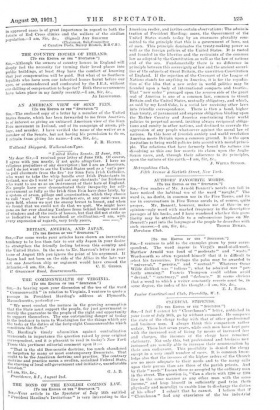THE BOND OF THE ENGLISH COMMON LAW. [To THE EDITOR
or THE " SPECTATOR."] Ste,—your article in the Spectator of July 16th entitled President Harding's Invitations" is very interesting to the American reader, and invites certain observations : The adminis• tration of President Harding; more, the Government of the United States stands to-day by an enormous plurality com- mitted to the principle that this is a government of laws, not of men. This principle dominates the treaty-making power as well as the foreign policies of the United States. It is rooted and founded in the liberties and the restraints of the common law as adopted by the Constitution as well as the law of nations and of the sea. Fundamentally there is no difference iu Principle between this sovereignty of law and the ancient securi- ties of Me subjects of Great Britain, the unwritten Constitution of England. if the rejection of the Covenant of the League of Nations stands for anything in America, it is for the repudia- tion of the idea that a new order in world politics may be founded upon a body of international compacts and treaties. That " new order " presaged upon the reverse side of the great seal of America is one of a common law, common to Great Britain and the United States, mutually obligatory, and which, as said by my Lord Coke, is a social law receiving other laws into friendly correspondence. There is then a bond, higher than treaty, of paramount and supreme obligation binding upon the Mother Country and America constraining their world policies to perpetual accord, inviting always reciprocal obliga- tions and comity in other nations, and destined to overrule the aggression of any people whatsoever against the moral law of nations. In this hour of feverish anxiety and world revolution America meets Britain upon a common ground. It is the open invitation to bring world policies into accord with moral princi- ple. The relations that have formerly hound the nations are dissolving as this one law asserts its claim upon the Anglo- Saxon races, and, through their adherence to its principles, upon the nations of the earth.—I am, Sir, &c., J. WIITTLA STINSON.
Metropolitan Club, Fifth Avenue & Sixtieth Street, New York.


































 Previous page
Previous page